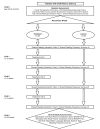Book-Sharing for Toddlers with Clefts (BOOST): Protocol for a randomized controlled trial of a remote intervention to promote language development in children with cleft palate
- PMID: 38870107
- PMCID: PMC11175488
- DOI: 10.1371/journal.pone.0304630
Book-Sharing for Toddlers with Clefts (BOOST): Protocol for a randomized controlled trial of a remote intervention to promote language development in children with cleft palate
Abstract
Background: Children with cleft palate, with or without cleft lip (CP±L), exhibit language delays on average compared to children without clefts. Interventions to address these disparities are scarce. In this multi-center study, Book Sharing for Toddlers with Clefts (BOOST), we will test a remote, parent-focused intervention to promote language development in children with CP±L.
Objectives: The study will test two primary hypotheses. First, toddlers randomized to BOOST will exhibit better language outcomes than children receiving standard-of-care (SOC). Second, we hypothesize that the BOOST program's effect on language outcomes is mediated by the frequency and quality of parent-child reading interactions.
Methods: The study is a randomized-controlled trial comparing the BOOST group to a SOC comparison group. We will enroll N = 320 English and/or Spanish-speaking children ages 24-32 months with isolated CP±L (n = 160 per group). Both groups will receive children's books, and parents will record and upload videos of themselves reading the books with their children using a smartphone app developed for the study. Parents will also complete surveys asking whether they read to their children on five randomly selected days each week. In addition, the BOOST group will participate in 3 remote dialogic book-sharing intervention sessions via Zoom. We will code book-sharing videos to assess parents' target skill usage and children's expressive language. End-of-study assessments will include measures of child language outcomes (e.g., clinician-administered measures, parent reports, and naturalistic child language samples).
Results: Enrollment began in April 2024 and will continue through approximately April 2028.
Conclusion: The BOOST study will address a critical gap in the literature on interventions to improve language in children with CP±L. The results will inform the care for toddlers with oral clefts and have potential applications for other populations.
Copyright: © 2024 Collett et al. This is an open access article distributed under the terms of the Creative Commons Attribution License, which permits unrestricted use, distribution, and reproduction in any medium, provided the original author and source are credited.
Conflict of interest statement
No authors have competing interests.
Figures
Similar articles
-
Telepractice Parent Training of Enhanced Milieu Teaching With Phonological Emphasis (EMT+PE) For Persian-Speaking Toddlers With Nonsyndromic Cleft Palate: Protocol for a Randomized Controlled Trial.JMIR Res Protoc. 2024 Apr 19;13:e54426. doi: 10.2196/54426. JMIR Res Protoc. 2024. PMID: 38640014 Free PMC article.
-
Parent-implemented early intervention design for improving speech and language skills among Mandarin-speaking infants and toddlers with cleft lip and/or palate.Front Public Health. 2025 Jan 20;13:1458452. doi: 10.3389/fpubh.2025.1458452. eCollection 2025. Front Public Health. 2025. PMID: 39902395 Free PMC article.
-
A protocol for a randomized-controlled trial to investigate the effect of infant sign training on the speech-language development in young children born with cleft palate.Int J Lang Commun Disord. 2023 Nov-Dec;58(6):2212-2221. doi: 10.1111/1460-6984.12920. Epub 2023 Jun 28. Int J Lang Commun Disord. 2023. PMID: 37376898
-
Parent-mediated interventions for promoting communication and language development in young children with Down syndrome.Cochrane Database Syst Rev. 2018 Oct 15;10(10):CD012089. doi: 10.1002/14651858.CD012089.pub2. Cochrane Database Syst Rev. 2018. PMID: 30321454 Free PMC article. Review.
-
Communication interventions for autism spectrum disorder in minimally verbal children.Cochrane Database Syst Rev. 2018 Nov 5;11(11):CD012324. doi: 10.1002/14651858.CD012324.pub2. Cochrane Database Syst Rev. 2018. PMID: 30395694 Free PMC article.
References
-
- Parker SE, Mai CT, Canfield MA, et al.. National Birth Defects Prevention Network. Updated National Birth Prevalence estimates for selected birth defects in the United States, 2004–2006. Birth Defects Res A Clin Mol Teratol. 2010; 88: 1008–16. - PubMed
Publication types
MeSH terms
Grants and funding
LinkOut - more resources
Full Text Sources
Medical
Miscellaneous


